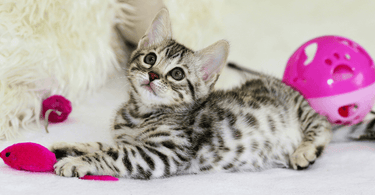By Francesca Lees BSc (Hons) NCert (AnBeh) ISFM CertFN ABTC – ATI RVN
Why is it important to move our cats from kitten to adult food?
Nutritional needs:
When kittens are young (usually during the first year of life) they grow rapidly and they burn off lots of calories doing so. As they approach adulthood (around one year old) they no longer grow at such a rapid rate. Adult food contains lower levels of fats, proteins, and calories as kittens no longer need the extra energy for growth.
Spaying and neutering:
Spaying or castrating of cats is usually done when the cat is around 5-6 months of age. Having a cat neutered can have an influence on when cat care givers believe it’s time to switch their kitten onto adult or neutered cat food. Neutering can affect your cat's metabolism in a few ways. Generally, it tends to lower a cat's metabolic rate, which means your cat may require fewer calories than before the procedure. This can lead to weight gain if their diet isn't adjusted accordingly. Neutering also often results in changes in behaviour, such as reduced activity levels, which can also contribute to weight gain.
Most cat care givers switch their cats onto adult food around 12 months of age however if you’ve had your cat neutered before this age then should you switch them before this? The short answer is… no!
Kittens have special nutritional needs for their growth. They need more protein, fat, and other nutrients than adult or neutered cat food provides. Adult cat foods aren’t designed for the growing needs of young kittens. Studies in this area of feline feeding recommend feeding your kitten a diet meant for their growth until they’re at least 12 months old. Adult or neutered adult cat food doesn’t offer the right nutrients for young cats and cats should be kept on kitten food until around 12 months of age (JAVMA, 2005) and (VCNA, 2008).
Switching to adult or neutered adult cat food too early could lead to missing out on important nutrients. Kittens need that extra nutrition to grow up strong and healthy.
When do I transition my cat to adult cat food?
Most cats will be around 12 months of age when they reach maturity. If your cat has been neutered, you can switch them to an adult neutered cat food. If they have not been neutered you can switch them to an adult cat food.
If you have a very active cat who is outdoors a lot or a very high energy breed, such as a Bengal, then these cats can need more calories than a standard neutered cat and can therefore benefit from being on a standard adult cat food rather than neutered cat food. Indoor cats also tend to use less energy and burn less calories so even if your cat hasn’t been neutered it can be more beneficial for them to be on a neutered cat food as it contains less fat than standard adult cat food.
You’ll also notice signs that it’s time to switch your cat onto adult food such as their growth slowing down and their behaviour changing. If you regularly weigh your cat you’ll also notice they aren’t gaining weight as rapidly as they did when they were young and you’ll usually notice them plateauing in weight. In terms of behaviour you may notice they aren’t playing as much and don’t seem to have as much energy as they did when they were younger.
So once you’ve chosen which food you’re going to transition them onto it’s time to switch them over to their new food.
How do I transition my cat from kitten food to adult food?
Now, it’s really important we don’t do a sudden switch and just give them a bowl full of their new food straight away. Sudden changes in diet can lead to stomach upset and symptoms such as diarrhoea and vomiting.
To ensure your cat switches over to their new food safely we do this gradually over 7 days.
- On day 1 you would fill your cats bowl with 1/7 of their new food and 6/7 of their old food
- On day 2 you would fill their bowl with 2/7 of their new food and 5/7 of their old food
- On day 3 you would do 3/7 of their new food and 4/7 of their old food…… you get the idea!

Eventually on day 7 you should have mainly the new food with only a small amount of the old food. The next day you can fill their bowl with only the new food.
Make sure to monitor your cat's digestion and overall health during the switch. If your cat shows any sign of illness contact your vet straightaway. Symptoms include vomiting, diarrhoea, lethargy, blood in their poo or refusing to eat or drink.
Vet nurse top tips!
- Make sure to consult your vet before you switch foods just to make sure they are happy for you to do this
- If your cat has any specific needs or dietary requirements please check with your vet first before you switch their food. If your cat had any health issues when they were younger, even if they are better now, it’s still important we check with a vet first.
- Make sure you are feeding the correct amount of food for your cat! It’s easy to accidentally overfeed or underfeed them if you “guesstimate” how much food they need. Make sure to follow the instructions on the back of your cats food packaging and portion out their food accordingly, for example:

- A really handy tip to make sure you don’t over or underfeed your cat is to weigh out their food on a weighing scales on the first day and then pour this into a plastic cup. Then draw a line with a permanent marker pen where the food reaches inside the cup. Then you can use this cup every day as a scoop. Make sure you always scoop the food into the cup up to this line! This ensures your cat gets the same amount each day!

And finally, remember…
- Keep your kitten on kitten food until they are at least 12 months old even if they’ve been neutered as a kitten (unless you’re using a specific food for neutered kittens or your vet has said you can move to adult food earlier)
- Make sure to choose the right food for their age, breed, lifestyle and neuter status (indoor vs outdoor, neutered vs not neutered, active breed vs more sedentary breed etc!)
- Make sure to switch their food slowly over 7 days and not rapidly switch
- Make sure to consult your vet before you switch their food and especially if they’ve ever had any previous health issues
If you need advice on your kitten's health or behaviour, contact Francesca.

